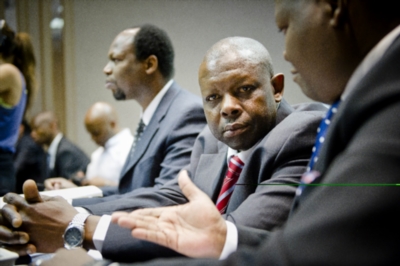This after a 'conflicting version of events regarding an alleged assault incident between [judges] Hlophe and Parker'.

Judge President John Hlophe.
Western Cape Judge Andre Le Grange has refused to preside over matters with fellow Judge Mushtak Parker due to what he calls a “prevailing climate of untruthfulness” over an alleged incident involving Parker and Judge President John Hlophe.
“My decision to recuse myself in matters where I am called upon to preside with Judge Parker was not taken lightly, but after deep reflection and in accordance with my own conscience,” Le Grange said in a letter addressed to the Judge President.
The letter, dated 11 March 2020, expresses concern over the conflicting version of events regarding an alleged assault incident between Hlophe and Parker.
Le Grange claims that it is Parker’s version that Hlophe “without provocation, intentionally pushed him in his own chambers”, but that in the same breath Parker agreed with Hlophe’s version where he denied the attack, which is recorded as saying: “the Judge concerned has been shown this portion of the affidavit relating to him and agrees with this version”.
“It is inconceivable that Judge Parker, with vast experience of criminal law as an attorney, could be mistaken on that issue. Yet, your statement is in total contradiction to what Judge Parker has told me (and many other colleagues) about what transpired in his chambers,” Le Grange’s letter reads.
As a result of the two versions presented by Parker, Le Grange says he has resolved to take this position until the complaint has been dealt with and logically concluded.
Parker hit back at Le Grange in a letter on Friday, calling his decision to recuse himself in matters over which he presides “contrived, purely opportunistic, and perhaps a cynical attempt to influence the proceedings involving the Judge President which are currently before the Judicial Conduct Committee (JCC)”.
Parkers said, that upon reflection, he had realised the alleged altercation with Hlophe “may not have unfolded in the way that [he] initially perceived”.
“This quite understandable given my emotional state at the time. I therefore came to the firm but inescapable conclusion that a complaint of my nature in this regard, will be both inappropriate and unnecessary,” he said.
Parker asserted further that he regarded the matter with Hlophe to be personal, private, confidential and fully resolved.
He categorically denied that he had told Le Grange or anyone else that he was influenced or persuaded by any of his colleagues to not pursue a complaint against the Hlophe, accusing Le Grange of wanting to destroy the Judge President at any cost.
“As far as I am concerned, I am satisfied that there is absolutely no basis for a complaint against the Judge President, and [I] request you once again to respect my decision,” Parker said.
Hlophe has called Le Grange’s conduct and the publication of his highly confidential letter “unfortunate and inappropriate”.
“This is unbecoming of a judicial officer, especially when proceedings relating to your allegations are pending before the JCC,” Hlophe said in a letter on Friday.
He, however, opted not to comment on the remaining contents of the letter.
Hlophe and his deputy, Patricia Goliath, have laid complaints against each other before the Judicial Conduct Committee.
In January, Deputy Judge President Goliath lodged a 14-page gross misconduct complaint against the Hlophes, accusing them of compromising the proper functioning of the Western Cape High Court.
Hlophe, in a 100-page affidavit, dismissed the complaint and accused Goliath of leaking her complaint to the media in a “malicious and bad faith attempt to generate public outrage, lynching and condemnation of my leadership of the division that would support calls for my immediate suspension and removal”.
Deputy Chief Justice Raymond Zondo has since referred both complaints to the JCC.
The secretariat of the JCC said in a statement on February 12 that it would consider whether it should recommend to the Judicial Service Commission (JSC) that the complaints be investigated and reported on by a tribunal.
“After considering both Deputy Judge President Goliath’s complaint against Judge President Hlophe and Judge President Hlophe’s complaint against Deputy Judge President Goliath, the Deputy Chief Justice was satisfied in terms of Section 16(1) of the Judicial Service Commission Act… that each one of the two complaints, if established, would be likely to lead to a finding by the Judicial Service Commission that the respondent judge in each complaint is guilty of gross misconduct,” the statement read.
For more news your way, download The Citizen’s app for iOS and Android.





